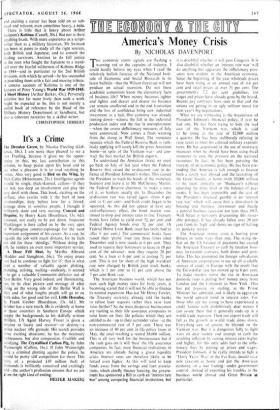It's a Crime
The Dresden Green, by Nicolas Freeling (Gol- lancz, 18s.). I am more than pleased to see a new Freeling, because it gives me the oppor- :unity in this, my last contribution to this column, to heap praise upon his head and to say what a pleasure it is to read anything he m-ites. Also very good is Bird on the Wing, by \lax Catto (Heinemann, 21s.). Intelligence agents should be single, thick-skinned, callous—if they Are not, too deep an involvement can play the very devil with them. This book, exciting on the surface, also carries with it the hurt of torn relationships, duty before love for a friend; damage done to sensitive people. I thought it brilliantly done and very moving. Conceal and Disguise, by Henry Kane (Boardman, 13s. 6d.). Unusual, not easily to be put down. Inspector MacGregor is here called on by the very apex of Washington counter-espionage for the most important assignment of his career. As a cop, he regards the job with much distaste, for he feels too old for these 'shindigs.' Without doing the job, he renders an even more important service. A Door Fell Shut, by Martha Albrand (Hodder and Stoughton, 16s.). 'To enjoy peace tsti had to continue to fight for it': that is what kept a number of valuable agents plotting, planning, striving, waiting—endlessly, it seemed —to get a valuable Communist defector out of East Berlin. Very good indeed, and illuminating, too, in its clear picture and message of what living on the wrong side of the Berlin Wall is like; and of what lengths people will go to on both sides, for good and for evil. Little Hercules, by Frank Gruber (Boardman, 13s. 6d.). Mr Gruber has a sure touch. He is evidently at home in those countries in Southern Europe which supply the backgrounds to his skilfully written thrillers. US Agent Harvey Fraser is given a mission to locate and recover—or destroy—a stolen nuclear rifle grenade. His search provides some exciting situations; he has the necessary ruthlessness, but also compassion. Credible and satisfying. The Crystallised Carbon Pig, by John Wainwright (Collins, 16s.). If John Wainwright ""ere a criminal plotting against the police, he would be pretty stiff competition for them: This story of a projected flO million theft of diamonds is brilliantly conceived and excitingly told—the author's profession ensures that we are given the right kind of ending.
HESTER MAKEIG






























 Previous page
Previous page